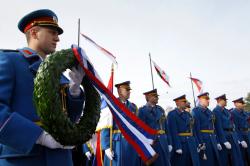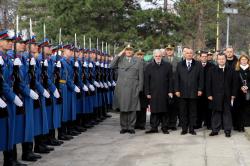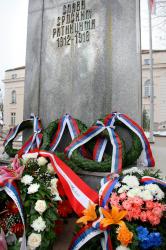- About MoD
Minister and Associates
- Minister
- State Secretary
- Assistant Ministers
- Secretary of the Ministry of Defence
Sectors
- Defence Policy Sector
- Human Resources Sector
- Material Resources Sector
- Budget and Finanance Sector
- Sector for Infrastructure and Hospitality Services
- SAF
- Documents
- Services
- Sport
- Archive
- Contacts
15.12.2012.
Marking the 98th anniversary of the Kolubara battle
 Central government event marking the 98th anniversary of the Battle of Kolubara was held today in Lazarevac.
Central government event marking the 98th anniversary of the Battle of Kolubara was held today in Lazarevac.The commemoration began by paying state and military honors at the Memorial Church of St. Dimitrije. Wreaths were laid by the Prime Minister of Serbia, Ivica Dacic, the delegation of the Ministry of Defence and the Serbian Armed Forces, led by Deputy Chief of General Staff Major General Milan Bjelica, representatives of the municipality of Lazarevac, Embassy of Austria, Hungary, Slovakia and the Czech Republic to Serbia, as well as many representatives of a number of municipalities and NGOs oriented for preserving the tradition of Serbian liberation wars.
Wreaths were laid at the monument of the Serbian warrior in the center of Lazarevac.
 In front of the Memorial Church of St. Demetrius, in the vault of which some 40 000 Serbian and Austro-Hungarian soldiers were laid to rest, Serbian Prime Minister Ivica Dacic said that it was the duty of the citizens of Serbia to cherish the memory of the victims and to persist in building a society based on the values and ideals humanism and nonviolence. Dacic said that the memory of the victims ancestors celebrates life, not death.
In front of the Memorial Church of St. Demetrius, in the vault of which some 40 000 Serbian and Austro-Hungarian soldiers were laid to rest, Serbian Prime Minister Ivica Dacic said that it was the duty of the citizens of Serbia to cherish the memory of the victims and to persist in building a society based on the values and ideals humanism and nonviolence. Dacic said that the memory of the victims ancestors celebrates life, not death."Let this gathering turn into yet another plea for peace, understanding and tolerance among nations, religions and countries. This would be the best way to repay our common ancestors who gave their lives for freedom. Their sacrifice is infinite, as is our responsibility to continue in the right direction great, "Dacic said.
He recalled that the Battle of Kolubara is remembered as the battle where a complete collapse of our army had been predicted but was promptly reorganized and moved a counter in which the enemy suffered defeat, with general Zivojina Misic as the commander and strategic of the army who is today studied at military academies throughout world.
 ThebBattle of Kolubara represents the biggest clash between the Serbian and Austro-Hungarian army in World War I and it was fought in November and December 1914 at the front, about 200 kilometers long. The battle ended in a successful counterattack of the First Army under the command of General Zivojin Misic
ThebBattle of Kolubara represents the biggest clash between the Serbian and Austro-Hungarian army in World War I and it was fought in November and December 1914 at the front, about 200 kilometers long. The battle ended in a successful counterattack of the First Army under the command of General Zivojin MisicSome 165,000 Serbian soldiers, NCOs and officers were no longer in ranks, 22,000 were of whom were killed and about 91,000 wounded. The Austro-Hungarian losses were much higher, since over 270,000 soldiers, NCOs and officers were removed from the ranks.
Thanks to the outcome of the battle, the Central Powers were forced to and fight on three fronts in 2015, Germany was forced to send a substantial part of its resources to the Balkans, and the victory of the Serbian army delayed Bulgaria’s joining the Central Powers
 PHOTOGALLERY
PHOTOGALLERY- About MoD
- Jurisdiction
- Organisation scheme
- Description of duties
- Minister and Associates
- Minister
- State Secretary
- Assistant Ministers
- Secretary of the Ministry of Defence
- Sectors
- Defence Policy Sector
- Human Resources Sector
- Material Resources Sector
- Budget and Finanance Sector
- Sector for Infrastructure and Hospitality Services
- Special Internal Units
- Office of the Minister of Defence
- Secretariat
- Military Attorney's Office
- Administrative Bodies within MoD
- Defence Inspectorate
- Military Intelligence Agency
- Military Security Agency
- Autonomous Departments
- Public Relations Department
- Military Healthcare Department
- Higher Education Institution
- Defence University
- Specific internal units
- Inspector General of the Services
- Internal Audit Section
- SAF
- Documents
- Services
- Sport
- Archive
- Contacts

